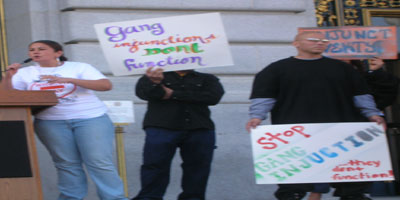Part 2 in a PNN series
 |
|
by Sam Drew/PNN "We are not afraid of these politicians who are trying to criminalize our youth," said Renee Saucedo to a crowd gathered in front of San Francisco City Hall to protest San Francisco City Attorney Dennis Herrera's recent gang injunction. Approximately ten days ago, a San Francisco judge upheld the City Attorney's application for the injunction, which prohibits certain individuals' presence within the injunction zone. We were there to speak out against these racist, criminalizing polices. "These injunctions only cause more racial profiling and police harassment against Latino and African-American communities," Luis Aroche, a youth advocate with the Mission Community Response Network, said to the crowd filled with youths, teachers and scholars from neighborhoods across the Bay Area. To clearly and symbolic illustrate our demands, we had decided to confront City Attorney Dennis Herrera in his office in City Hall and serve him with a symbolic injunction notice ordering him to stay out of our neighborhoods, which include the Mission, Bayview/Hunter’s Point and the Western Addition. Also included on the injunction notice were six demands from the community: According to Sandy Banks Los Angeles Times staff writer, "The LAPD has intensified it's war on gangs with stepped up patrols and tough enforcement of a year old court injunction that allows the arrest of Grape Street Crips if they congregate in the project or on surrounding streets. Councilwoman Janice Hahn, who represents the area, said her office has been deluged with complaints from residents who say officers' heavy handed tactics are saddling young men with arrest records and increasing hostility towards the police. At her prodding, LAPD Chief of Police, William J. Bratton and City Attorney, Rocky Delgadillo have pledged to review the injunction process." We were calling for not just a review, but an end to the gang injunction in our neighborhoods, streets, parks and communities. As we walked through City Hall to meet Mr. Herrera, I noticed how much the building resembles a mausoleum with its cold marble interior and how the presence of tortured spirits being held against their will permeated the environment. In contrast, the heat that emanated from the young people seeking an end to this injunction added life to the desolate, soul less environment. One after another, we piled into the City Attorney's Office to show our unity. The receptionist looked extremely concerned by the presence of all these Bay Area citizens exercising their rights. After leading a chant Renee Saucedo announced the purpose of our visit and requested Mr. Herrera to accept our papers. After a few seconds of awkward silence the spokesperson for Mr. Herrera said he was busy in a meeting and couldn't come out to receive his papers. I could tell by how tight the spokeswoman had her arms clenched that they weren't used to having to deal with that many citizens. The law enforcement officer who stood next to Herrera's spokesperson told us, "He won't be coming out because no one made an appointment." Renee Saucedo swiftly responded "Dennis Herrera didn't make an appointment with us when he started the gang injunction." Her response was met with applause and cheers. Because Mr. Herrera refused to meet with our group, an earful of scholarship was given to the nervous spokeswoman, as many people spoke to how this injunction is a policy only aimed at criminalizing young people. Although we weren't allowed to see Mr. Herrera, we decided to continue on in the belly of the beast and meet with our elected officials. After all they do work for us. We went into the offices of Supervisors Peskin, Chu, Sandoval, Amminano, Dufty, Maxwell, Alito-Pier and Daly. A copy of the injunction was given to each one’s staff person along with the reasons we wanted the gang injunction to be stopped. A Southern California newspaper reported that its review of the impact of a local gang injunction showed that nearly 80% of the gang members named in that injunction had been convicted of at least one crime since the injunctions were imposed. More than half of those convicted committed crimes in the injunctions target neighborhoods, indicating that gang members neither ended their criminal acts nor moved away after being served with court orders to do so and that these gang injunctions do little to decrease gang violence. As Nancy Hernandez, (Homies Organized in the Mission to Empower Youth) said, "This gang injunction is attacking a symptom of the problem not the root cause. The problems are poverty, gentrification, Lack of programs, lack of jobs and after school programs." As we walked down the spotless halls of power I was reminded of the words uttered by Minister Christopher Muhammad when he spoke at a rally about San Francisco politics, he said, "They use the word gentrification but the real word is ethnic cleansing, to remove poor people of color in every neighborhood." |



